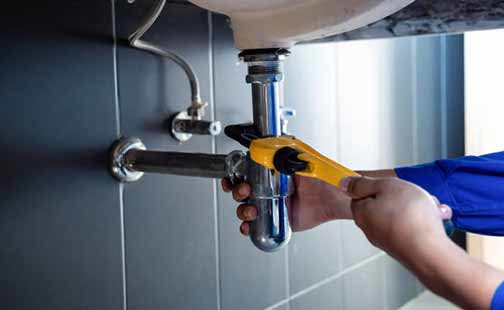
When it comes to home repairs and maintenance, understanding the distinct roles of a licensed plumber and a handyman is crucial. A licensed plumber is a professional who has undergone extensive training and certification to handle all types of plumbing issues, from minor leaks to major installations. On the other hand, a handyman is a generalist who can perform a variety of tasks around the home, including minor plumbing repairs, but lacks the specialized training and certification of a licensed plumber.
Knowing the differences between these two roles can help homeowners make informed decisions when it comes to their plumbing needs.
Key Qualifications and Training: Licensed Plumber vs. Handyman
The qualifications and training required for a licensed plumber are rigorous and comprehensive. Typically, a licensed plumber must complete an apprenticeship program that lasts several years, during which they gain hands-on experience under the supervision of experienced plumbers. They must also pass a series of exams to obtain their license. This extensive training ensures that licensed plumbers have the necessary skills and knowledge to handle complex plumbing issues safely and effectively.
In contrast, a handyman does not require formal training or certification, though many handymen have years of experience and a wide range of skills. While a handyman may be capable of handling minor plumbing repairs, their lack of specialized training can limit their ability to address more complex plumbing problems. This difference in training and qualifications can significantly impact the quality and safety of the work performed.
Scope of Work and Expertise: Licensed Plumber vs. Handyman
The scope of work that a licensed plumber can perform is extensive and includes tasks such as installing and repairing pipes, fixtures, and appliances, as well as diagnosing and resolving complex plumbing issues. Licensed plumbers are also knowledgeable about building codes and regulations, ensuring that all work is compliant with local laws. This expertise allows them to tackle a wide range of plumbing projects, from routine maintenance to major installations.
Handymen, while versatile, typically handle less complex tasks such as fixing leaky faucets, unclogging drains, and performing minor repairs. For more complicated plumbing issues, a licensed plumber is the preferred choice. Handymen may not have the specialized knowledge or tools required to address complex plumbing problems, which can result in subpar work or even further damage.
Legal Requirements and Licensing: Licensed Plumber vs. Handyman
Licensed plumbers are required to adhere to strict legal requirements and obtain a license to practice. This licensing process ensures that they have the necessary skills and knowledge to perform plumbing work safely and effectively. In many jurisdictions, it is illegal for anyone without a license to perform certain types of plumbing work. This legal requirement helps protect homeowners by ensuring that plumbing work is performed by qualified professionals.
Handymen, on the other hand, are not subject to the same stringent licensing requirements, which means they may not be legally permitted to perform certain plumbing tasks. This distinction is important to consider when hiring someone for plumbing work, as it can affect the legality and safety of the work performed. Homeowners should be aware of local regulations and ensure that any plumbing work is carried out by a licensed professional when required.
Insurance and Liability: Licensed Plumber vs. Handyman
Another critical factor to consider is insurance and liability. Licensed plumbers typically carry liability insurance, which protects both the homeowner and the plumber in case of accidents or damage during the job. This insurance coverage provides peace of mind and financial protection, ensuring that any potential issues are covered.
Handymen, however, may not always carry such insurance, which can leave homeowners vulnerable in case of mishaps. Without insurance, homeowners may be responsible for covering the costs of any damage or injuries that occur during the job. Ensuring that the professional you hire is adequately insured is essential for safeguarding your property and finances.

Quality and Reliability: Licensed Plumber vs. Handyman
The quality and reliability of work performed by a licensed plumber are generally higher compared to that of a handyman. Licensed plumbers have undergone extensive training and are held to high professional standards, which translates to better workmanship and fewer issues down the line. Their expertise and commitment to quality ensure that plumbing work is completed correctly and efficiently.
Handymen, while capable of performing a wide range of tasks, may not have the same level of expertise or consistency in their work. For critical plumbing tasks, hiring a licensed plumber ensures that the job is done correctly and reliably. Homeowners can trust that a licensed plumber will provide high-quality work that stands the test of time.
Cost Considerations: Licensed Plumber vs. Handyman
Cost is often a significant factor when deciding between a licensed plumber and a handyman. Generally, handymen charge lower rates than licensed plumbers, making them an attractive option for minor repairs and maintenance tasks. Homeowners looking to save money on smaller projects may find that a handyman offers a cost-effective solution.
However, for more complex plumbing issues, the expertise and assurance provided by a licensed plumber can justify the higher cost. Licensed plumbers bring specialized knowledge and skills to the job, ensuring that complex problems are addressed effectively and safely. It is essential to weigh the potential risks and benefits when considering the cost of hiring a professional for your plumbing needs. Investing in a licensed plumber for critical tasks can save homeowners money in the long run by preventing costly mistakes and ensuring high-quality work.
When to Choose a Licensed Plumber
There are specific situations where hiring a licensed plumber is the best choice. These include major plumbing installations, such as water heaters, replacing sump pumps, and new piping systems, as well as complex repairs that require specialized knowledge and skills. Licensed plumbers are equipped to handle these tasks with precision and expertise, ensuring that the work is completed to the highest standards.
Additionally, any work that must comply with local building codes and regulations should be handled by a licensed plumber to ensure legality and safety. Licensed plumbers are familiar with local codes and can ensure that all work is compliant, reducing the risk of legal issues or complications. For significant plumbing projects, the expertise and reliability of a licensed plumber are invaluable.
When to Choose a Handyman
Handymen are an excellent choice for smaller, less complex tasks that do not require specialized training or certification. These tasks can include fixing minor leaks, unclogging drains, installing fixtures, and performing general maintenance around the home. Handymen offer a cost-effective solution for everyday repairs and upkeep, making them a practical option for homeowners looking to address minor issues without breaking the bank.
For routine maintenance and minor repairs, a handyman can provide efficient and affordable service. Homeowners can rely on handymen for a variety of tasks, ensuring that their homes remain in good condition without the need for specialized expertise. By choosing a handyman for smaller jobs, homeowners can save money while still addressing their maintenance needs.
Conclusion: Making the Right Choice
In conclusion, understanding the differences between a licensed plumber and a handyman is essential for making the right choice for your plumbing needs. Licensed plumbers offer specialized expertise, legal compliance, and higher quality work, making them the superior choice for complex and critical plumbing tasks. Their extensive training and commitment to professional standards ensure that plumbing work is completed safely and effectively.
Handymen, on the other hand, provide versatility and cost-effectiveness for minor repairs and general maintenance. They offer a practical solution for everyday tasks, allowing homeowners to address minor issues without incurring the higher costs associated with licensed plumbers. By carefully considering the scope of work, legal requirements, insurance, and cost, homeowners can make informed decisions and ensure that their plumbing issues are addressed safely and effectively.
Ultimately, the choice between a licensed plumber and a handyman depends on the specific needs of the project. For major installations and complex repairs, a licensed plumber is the best option. For routine maintenance and minor repairs, a handyman can provide efficient and affordable service. By understanding the strengths and limitations of each professional, homeowners can make the right choice for their plumbing needs and ensure the long-term health and safety of their homes.

